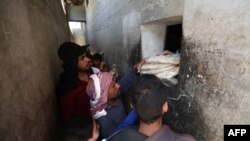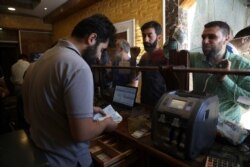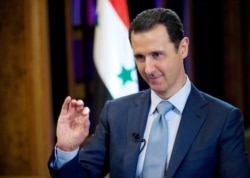The U.N. humanitarian chief appealed to the Security Council on Monday to extend authorization for aid to continue entering Syria through Turkey and to reinstate a closed border crossing from Iraq, crucial to delivering medical supplies as the country faces COVID-19.
“The cross-border authorization provides a lifeline for millions of civilians in northwest Syria,” Mark Lowcock told a virtual meeting of the council. “We cannot reach them without it.”
The council resolution authorizing aid convoys from Turkey into northwest Syria will expire July 10. In January, the council bowed to pressure from Russia and closed two of four existing crossing points, rather than risk losing the entire cross-border aid operation to a Russian veto. One crossing was between Iraq and northeast Syria and another between Syria and Jordan that had not been in recent use.
The Iraq crossing, known as al-Yarubiyah, was a lifeline providing critical medical supplies, including vaccines, therapeutics for chronic illnesses and trauma kits, to 1.4 million people in northeastern Syria.
The crossing was closed just weeks before the COVID-19 pandemic started to hit the region.
Today Syria has registered 256 confirmed cases of the virus and nine deaths, including six cases and one fatality in the northeast. But the government has administered only 8,000 diagnostic tests in a country of about 15 million people.
“Syria’s health system is not prepared for a large-scale outbreak,” Lowcock said.
In addition to COVID-19, Syria is facing its worst financial crisis of the nine-year conflict. Its currency is in free fall, commodity prices are skyrocketing, and many Syrians are struggling to afford food. The World Food Program estimates that 9.3 million people are food insecure, an increase of 1.4 million in just the past six months.
“Across the country, people who have struggled through nine years of devastating conflict are telling us that they have now reached breaking point,” Lowcock said.
He said the situation is particularly worrying in the northwest, where 70% of the population – about 2.8 million people – require humanitarian assistance. Lowcock said nearly a third of children younger than 5 suffer from stunting, something not prevalent in Syria before.
“Some say they are also cooking weeds to supplement the food rations, such is the level of desperation,” the aid chief said. He emphasized that current aid levels coming through the two remaining border crossings from Turkey into the northwest are insufficient and must be scaled up.
The region is one of the last rebel strongholds, and the government of Bashar al-Assad would like to see aid deliveries to its adversaries end in order to force the region back under government control.
The Syrian government wants all aid to go through Damascus. But the United Nations and many council members argue that “cross-line” deliveries alone, as they are known, are insufficient to meet the high level of need. They are calling for a renewal of the cross-border deliveries for at least another year and the reauthorization of al-Yarubiyah.
“Cross-line aid has clearly not compensated for that loss of the channel, despite recent improvements,” Susannah Sirkin of Physicians for Human Rights told the council of al-Yarubiyah’s closing. “For the council to expect a government responsible for igniting and perpetuating one of the worst humanitarian crises of our time to turn around and facilitate access to aid in good faith is an exercise in self-delusion.”
Russian envoy Vassily Nebenzia criticized council members for treating cross-border aid as the “magic solution” for the humanitarian situation.
“The cross-border mechanism, in fact, has become a political tool for drawing lines of division inside Syria,” he charged. He said unilateral sanctions imposed by the United States and European Union on Damascus are a bigger obstacle to relief operations.
Nebenzia singled out the recently enacted Caesar Act that Washington imposed on Damascus, which targets financial backers and other bad actors who support the Assad regime.
“Suggestions that our sanctions prevent humanitarian aid from reaching Syria is propaganda meant to distract from the horrors of the Assad regime and its irresponsible economic mismanagement,” U.S. Ambassador Kelly Craft said of the Russian accusations. “The Caesar Act and Syria sanctions do not target medicine or food.”
The sanctions, which went into effect June 17, also contain long-term humanitarian waivers.
Several council members also urged Russia to reconsider its June 23 announcement that it is withdrawing from a “de-confliction” mechanism intended to protect humanitarians and health care workers in Syria. Through this channel, the U.N. and humanitarian agencies notify parties to the conflict where they are operating so they will not be targeted. However, the U.N. has questioned whether in some instances this has had the opposite effect.
“Whether or not they participate in the humanitarian notification system, parties to the conflict remain bound by international humanitarian law, including the principles of distinction, proportionality and precaution,” the U.N.’s Lowcock said.







